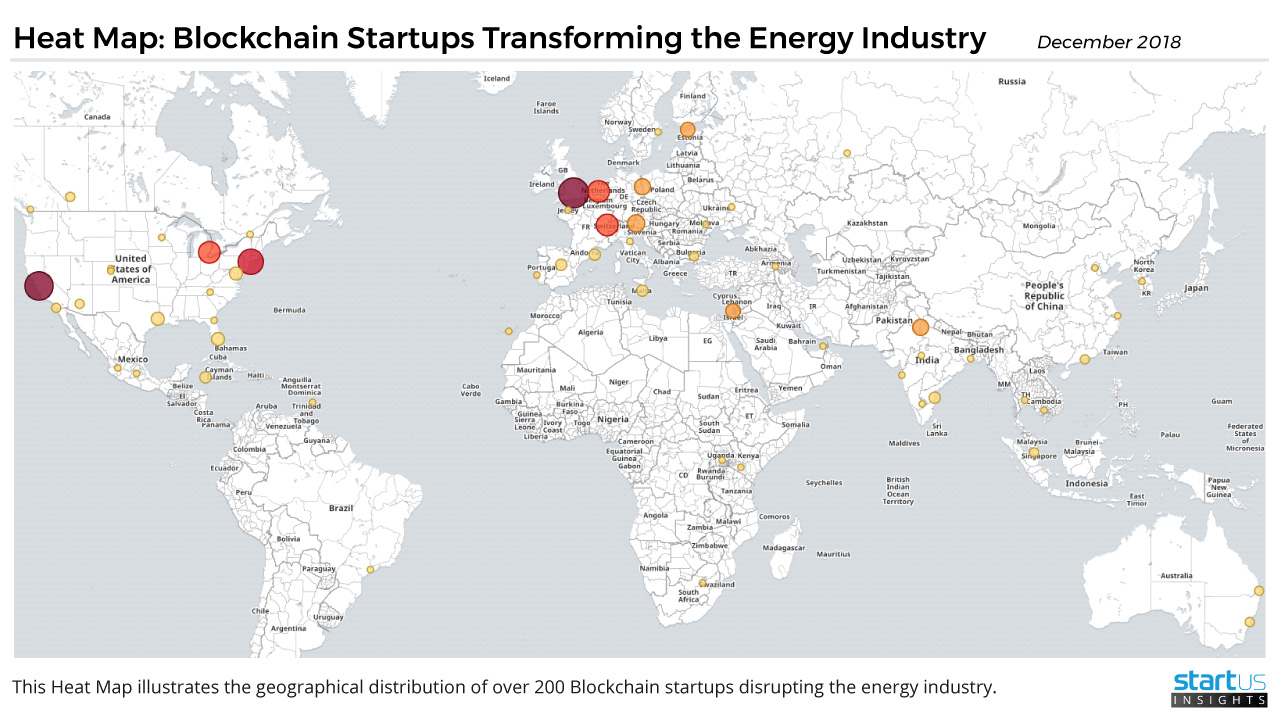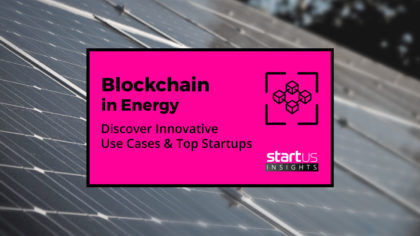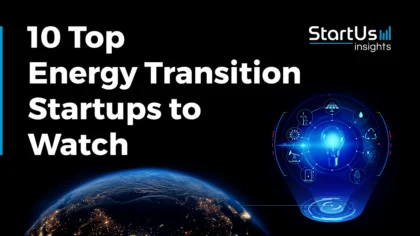Accelerate Productivity in 2025
Reignite Growth Despite the Global Slowdown
Despite its monopolization and current state, blockchain disrupts this industry in numerous ways. In 2017 alone, over 120 blockchain startups in the energy sector raised more than $300 million.
Key Takeaways
Here are some key takeaways of how blockchain impacts the energy industry:
- Transactions – peer-to-peer energy trading models that enable customers to sell excess power to each other
- Data Management – the verification and ownership of emission certificates as well as tracking of trading history are made safer, more transparent and easier to process
- Smart Contracts – ensure that excess energy is delivered into storage automatically; regulate supply and payment for energy producers and consumers
Heat Map: Blockchain Startups Disrupting The Energy Industry
Our team has created the Heat Map below to highlight the hotspots of blockchain startups disrupting the energy industry on a global level:

Click to enlarge
Global Distribution of Blockchain Startups in the Energy Sector (c) StartUs Insights
Selected Blockchain Startups Disrupting The Energy Industry:
- Power Ledger – An Australian company enabling peer-to-peer (P2P) energy trading for communities.
- Greeneum – An Israeli startup incentivizing customers for energy saving and eco-friendly lifestyles by earning carbon assets in the form of cryptocurrency for every watt-hour of renewable energy generated.
- Grid+ – A US startup that allows consumers to cut out the energy retailer and buy energy directly from producers via an Ethereum-powered blockchain network, cutting and managing energy usage.
- Grid Singularity – A German startup focusing on the exchange of granular and private data between different parties within the energy market.
Blockchain offers new possibilities for the energy industry, varying from cost-savings, by eliminating third parties in energy deals and faster transaction settlements, all the way to the emergence of a new market of peer-to-peer excess and renewable energy trading.
Innovation Map: How Blockchain Startups Transform The Energy Sector
Our team of innovation analysts conducted a thorough and extensive research on the potential of blockchain in the oil, gas & energy industry, encompassing over 1.000 startups working in the field.
Below, you’ll find the Innovation Map highlighting the most promising application areas as well as a deep dive in each of the sections.
Transactions
Peer-to-peer energy trading is nothing new and has been around for quite some time now. It still has always required a central entity, usually a utility company, to facilitate such transactions and transfer energy from prosumers to buyers.
Blockchain radically changes that by cutting out the intermediary and allowing prosumers to trade directly with each other. This is of particular interest to individuals employing the use of renewable energy sources such as wind or solar energy to power their homes and other structures.
Australian Power Ledger has already raised $13 million for organizing local communities into so-called “microgrids”, which are essentially almost fully autonomous and independent of the national electricity grid.
Another example, Grid+, offers a way for homes to avoid dealing with energy retailers and buy from energy producers directly, using their Ethereum blockchain network to process transactions, thereby cutting costs for the end consumer.
Data Management
Data Management and all sorts of information regarding transactions or the transfer and verification of ownership is another field that blockchain transcends. Simply put, the technology’s nature is making the storage and management of data safer, quicker, more transparent, and easy to process.
Exemplary is blockchain’s use case for storing information on the ownership of elements of the Internet of Things (IoT) networks integrated within the energy industry. This includes smart meters and electricity generation plants among others.
Invoicing and billing clients for electricity and other energy supplies is also far more advanced and secure through blockchain, making it yet another successful application of blockchain in the energy sector.
Smart Contracts
There are a number of reasons why smart contracts are so promising. First of all, they are entirely devoid of ambiguous interpretation. For a contract to be executed and/or approved, a set of conditions has to be satisfied, with each of them requiring specific and quantifiable actions that have to be made. This feature helps saving substantial resources on legal matters.
Secondly, by being embedded into a blockchain, a smart contract does not rely on a centralized stakeholder for hosting and controlling, which eliminates chances of data manipulation and/or conflicts of interests. As such, any attempts to modify the contract or its contacts will be automatically corrected by other blockchain nodes, making it too expensive and nearly impossible to tamper with the agreement.
Blockchain-based contracts are highly relevant to the energy industry in terms of agreements for purchasing/selling electricity and other energy types. A smart contract can, for instance, trigger an automatic energy supply cut off in case a payment has not been received by a pre-specified date laid out in the agreement.
Another clause can automatically channel a surplus of generated energy into a storage reservoir and the other way around – extract excess energy from the storage and provide it where there is a shortage.
Essentially, smart contracts are able to balance energy supplies by demanding and executing various “if…then” transactions, both related to the flow of energy and monetary assets.
Conclusion
The energy industry and its internal processes today are still not secure enough, fast enough, and efficient enough to keep up with the digital transformation. Blockchain, however, is swiftly changing that by challenging the status quo of state-owned transaction intermediaries and various large utility monopolies and energy retailers.
In fact, blockchain technology is reshaping the industry as we know it, allowing consumers to save on electricity, make additional profits from saved energy and benefit from an eco-friendly lifestyle. Blockchain startups in this sector incentivize and help in monetizing renewable energy generation and thereby saving energy by allowing trade of emissions certificates and excess electricity generation.
Given the rapid development of this technology, it has become a necessity to stay informed of the most recent developments in the field to stay ahead of your competition.








